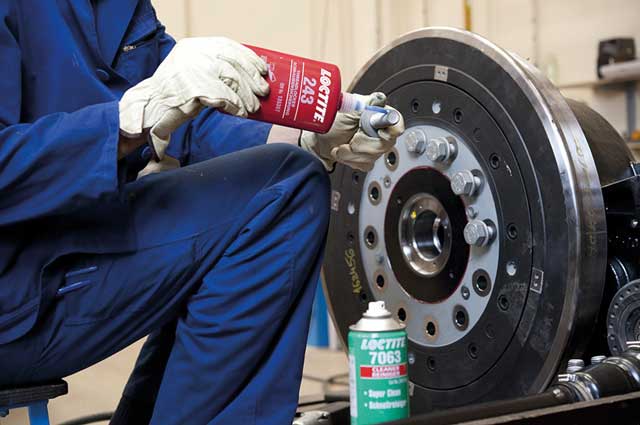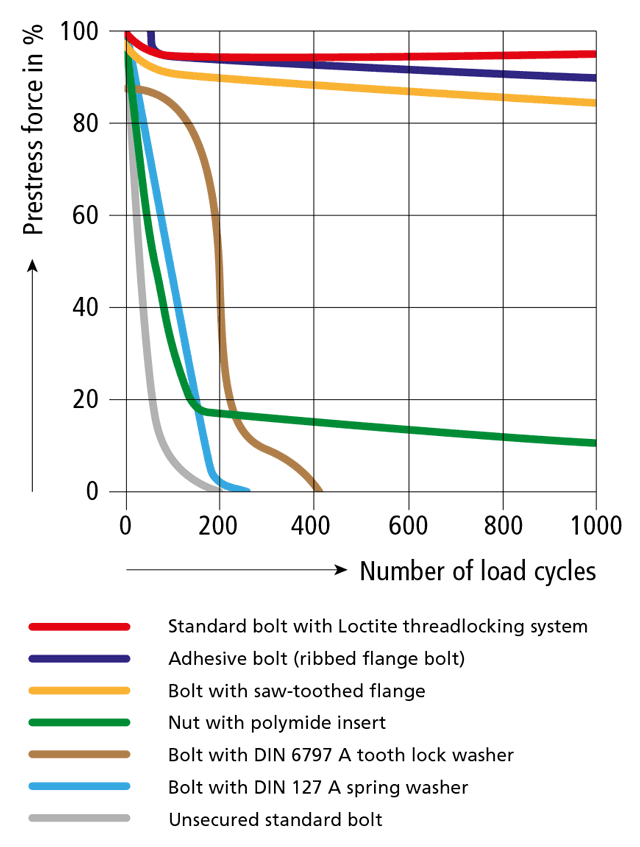
Preventing bolts coming loose in service is a perennial headache. Threadlocking adhesives can offer better performance than traditional mechanical locking devices, says Bob Orme, senior technology specialist at Henkel (Industrial Adhesives Division)
Threaded assemblies are the most important detachable parts used in machinery construction, installation and repair. Relaxation of tension and self-loosening is common for any machine, but when it is operating in a harsh environment, the need to minimise this effect with effective threadlocking is even more important. Various methods are available but what are their respective strengths?
Mechanical devices such as split pins and tab washers are only suitable for preventing the loss of nuts and bolts. Friction devices provide some resistance to vibration but do not perform well under extreme conditions. Locking devices such as tooth-flanged and ribbed-flanged bolts, nuts and washers are effective at preventing self-loosening but can damage the contact surface, need larger flange-bearing surfaces and are expensive.
Increasingly, threadlocking adhesives are taking the place of traditional mechanical locking devices because they provide all-round efficiency, especially under tough conditions. As well as preventing unwanted movement, loosening, leaks and corrosion, they resist vibration. They are free-flowing liquids or semi-solid adhesives which completely fill the gaps between mating threads of fasteners and joints.
Independent tests
To investigate the performance of its threadlocking system in comparison with other methods, Loctite submitted its products for independent testing. Tests were carried out using a transverse shock loading machine in which the bolt under test is used to clamp two plates together. Impact is applied from either side at right angles to the bolt axis. A load cell attached to the bolted assembly measures the clamp load in the bolt throughout the test cycle.
An M10 bolt was used, initially stressed to 80% proof load. Locking systems tested included an unsecured standard bolt; a bolt with a DIN 127 A spring washer; a bolt with a DIN 6797 A tooth-lock washer; a bolt plus nut with polyamide insert; a bolt with a saw-toothed flange; a ribbed flange bolt; and a standard bolt using Loctite 243, a medium strength threadlocker.
The reduction in stress in the bolt was continuously measured against the number of load cycles. Characteristic clamp load retention curves of the various locking methods were then compared (see diagram) .
The first three mechanical methods failed this test after around 200 to 400 load cycles. The others remained intact for 1,000 cycles, though the nut with polyamide insert lost between 80 and 90% of its prestress.
The Loctite system proved the most effective, retaining over 90% of its pre-stress. A similar performance was provided by the ribbed flange bolt, with the disadvantages that it is expensive, requires a relatively large amount of space for the flange bearing surface and causes unavoidable damage to the surface of the clamped parts around the bolt bearing.
The bolt with saw-toothed flange also performed well, but its teeth penetrate the bearing surface of the clamped material. The bearing surfaces of the head and the nut are damaged during loosening, limiting their possible applications. Parts with hardened surfaces cannot be reliably connected.
In comparison, Loctite threadlockers can cut costs by replacing special locking bolts or nuts, allowing less costly standard assemblies to be used.

A wide choice
Loctite threadlocking adhesives are available in varying viscosities and strengths to suit a wide range of applications. They are single-component and semi-solid adhesives that cure at room temperature to a hard, solid thermoset plastic when applied between steel, aluminium, brass and most other metal surfaces.
Low-strength formulations allow disassembly with standard hand tools and are ideal for adjustment screws, calibration screws, meters, gauges and for thread sizes up to M80. Medium strength provides greater performance and is good for machine tools, presses, pumps, compressors and gearboxes.
High-strength products are used where frequent dismantling is unlikely. They may require localised heat for removal, as do wicking compounds that are widely used for pre-assembled fasteners.
For more information visit www.henkel-adhesives.co.uk

